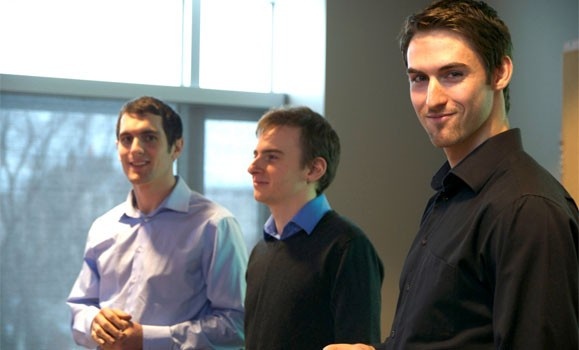Three students from the Rowe School of Business have become the first group to be admitted into The Next 36, Canada’s most prestigious competition for student entrepreneurs.
“The Rowe School of Business has a culture of genuine respect and collaboration,” says team member Cam McDonald. “We are taught to not look at everything as a zero-sum game situation but as an opportunity to work for a common goal.”
Typically, students enter The Next 36 competition as individuals. At stake: $80,000 in seed capital for their business idea, in-kind services from sponsors, nine months of CEO-level mentorship and a three-month educational program taught by world-class faculty from Harvard, MIT, Wharton, Ivey and Rotman. The winners have Canada's premier entrepreneurs, business leaders, professionals, corporations and investors — plus Canada’s top young entrepreneurs and leaders — as a peer network.
The three Bachelor of Commerce students — McDonald, Zack Levy and Daniel Bartek — knew each other through school (the trio developed “Sage Mixology,” a ready-to-mix drink device, during the Starting Lean course last year) and felt their strengths meshed well enough that, rather than competing with each other, they should unite and work through the competition together.
The problem was that they were already registered as individuals in The Next 36, each of them surviving as the competition was narrowed down to 72 contestants. And the selection committee wasn’t keen on their teaming up late in the process. Their proposed solution: leave the competition but enter it from scratch as a team with one business idea.
Rebuilding from scratch
Back at square one, they developed a business idea of Levy’s called . It’s a patent-pending “global digital wallet” technology that allows for individuals with dependents to control their spending. For example, parents can set up a digital account for their children to shop online or at phone-swiping NFC-ready checkout terminals while still having control over the account. Some of the options include yes/no approval and parameters based on time, amount and location.
Ěý
For three months, they worked to build the Purchext idea to the point where it could stand on its own in the competition. Last week, it paid off: they became the first group ever to be admitted to The Next 36.
“This culture has given so much strength to our new venture team,” says McDonald, speaking to the Rowe School of Business. In particular, the team credits Ed Leach, director of the Norman Newman Centre for Entrepreneurship, with MacDonald calling him “our greatest mentor and champion.”
The team also received financial support from the new Kivuto Solutions IT Entrepreneurship Fund and mentoring from Ram Raju, a HÂţ» alum and president and CEO of Kivuto Solutions.
“When I met these students, I was extremely impressed with their character and courage, says Greg Hebb, director of the Rowe School of Business. “They took a big risk, but their integrity and willingness to stand as one was amazing and a great example of living values-led management.”
The Purchext team will join the other 35 members of The Next 36 as the 2013 program gets underway this summer. They also came away with big wins at this past weekend’s Canadian Business Model Competition: McDonald and Levy presented Purchext and took the competition’s silver prize, winning $3,000 in cash and $7,000 in services, while Bartek’s presentation of Sage Mixology won the bronze.

